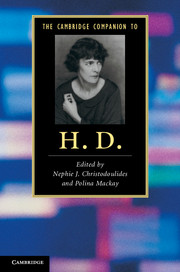10 - H.D. and translation
from PART II - WORKS
Published online by Cambridge University Press: 28 November 2011
Summary
The idea and practice of translation is central to H.D.'s writing and selfconception throughout her career. Her first efforts as a poet were translations from Heine and Theocritus; her first poems (1913) were translations from the Greek Anthology; her first published monograph was a translation, Choruses from the Iphigeneia in Aulis of Euripides (1916). This pamphlet and later ‘choruses’ from the Hippolytus (1919) were published in the Poets' Translation Series, which she helped her husband Richard Aldington to edit between 1915 and 1919. Early efforts culminated in Collected Poems (1925) with about ten lyric poems incorporating original translation, translated ‘choruses’ from Euripides, and a translation of the opening lines of the Odyssey. Throughout the 1920s she wrote a series of essays on Greek writers and two historical narratives that incorporate translation from Greek. Her experiments continued with Hippolytus Temporizes (1927), an original play in close dialogue with Euripides' drama; with translations of other Euripidean choruses in Red Roses for Bronze (1931); and with her only translation of a complete play, Euripides' Ion, Translated with Notes (1937). Even at the very end of her career, after completion of Helen in Egypt, H.D. in a late diary (1955) was contemplating further translations of Euripides, which she apparently never initiated.
Moreover, H.D. clearly imagined herself as translator, perhaps as much as poet. In autobiographical fictions – especially ‘Hipparchia’ in Palimpsest (1926) and Bid Me to Live (1960) – she figures herself as a translator of classical poetry, an activity that in these narratives seems almost indistinguishable from original composition. Hipparchia in her translation is inspired, in an ecstatic state of ‘intellectual sensuality’, catching ‘authentic metre [written] in the air’ (pp. 77, 79); and the detailed reflection on the process of translation in Bid Me to Live (pp. 163–4) is perhaps the clearest statement of H.D.’s early poetics.
- Type
- Chapter
- Information
- The Cambridge Companion to H. D. , pp. 143 - 158Publisher: Cambridge University PressPrint publication year: 2011

